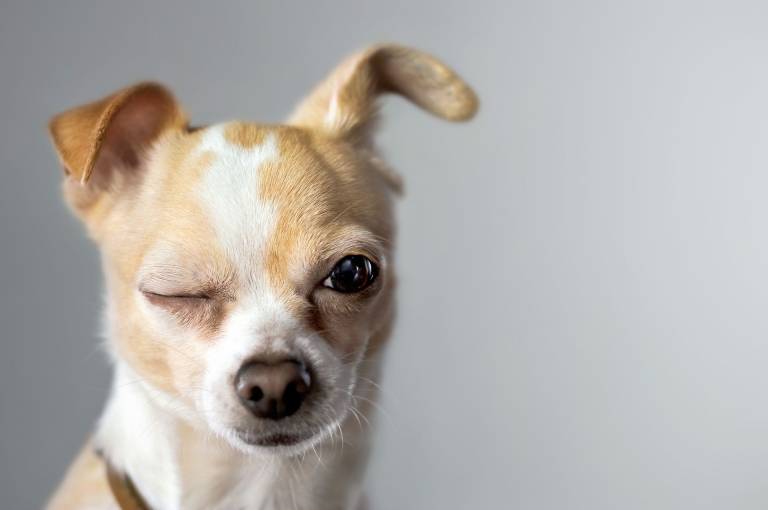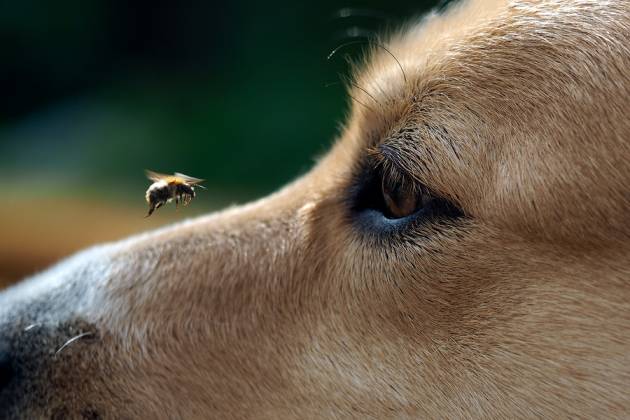We’re all used to our dogs having a boundless appetite. It doesn’t matter what time of day it is or how recent their last meal was, we are generally accustomed to seeing that adorable face and wagging tail telling us that: actually, it would be really very good of you if you could see it in your heart to find a way to perhaps giving them a bit of your chicken. Normally you could set your clock by their meal-times because if you forget, they definitely won’t have done, and it’s a routine that we all find comforting.
Connect with a verified veterinarian in minutes. Licensed vets are available 24/7 to answer your questions. No need to worry about your furry family member.
However, there will be times when your dog will go off their food. Suddenly, the bowl is sitting there full and they’re either ignoring it, or actively pushing it away when you try and waft some delicious dinner under their noses. The feeling that something might be wrong with your dog is a truly terrible one, a sinking fear in the pit of your stomach that a loss of appetite means something very serious.
The fact of the matter is that there many different reasons why your pet does not feel like eating, and they range from illnesses to mood changes. Some require urgent attention, some mean that you should be rethinking your pet food choices, others just need a bit of a rethink about how and when you’re presenting their meals to them. Let’s have a look at some of the things that may be making your dog tell you that they’re not very hungry today.
They May Have Developed A Dental Issue
We’ve all found ourselves in a situation where we’ve had to adjust our diet to allow for some nasty tooth pain, and our dogs are no different. If your pet is actively avoiding chomping down on their usual meals, it may be because they’re suffering from a dental problem. As you might expect, canine dental issues are extremely common and they can include problems like an abscess, a broken or cracked tooth, a bad build-up of plaque or tartar, or even gingivitis.
These issues are only going to get more common as your dog gets older so it’s really important that you start preventative action from very early on. The good news is that taking care of your dog’s teeth is very simple: you’ve got to brush! There are a range of canine toothpastes and toothbrushes on the market, and this is something that you should be doing once a day. You’ll also get the added bonus of your dog having fresher breath than you might be used to!
They’re Having Stomach Issues
Now, this is the one we’re all worried about, isn’t it? The one that keeps us up at night worrying. It’s true that if your dog is continuing to refuse their meals, there is a good chance that there might be a medical issue that needs addressing. There are a few tell-tale signs that you should look for to make sure that it’s nothing too serious. If the dinner abstinence is accompanied by constipation, diarrhea or vomiting, or if you notice that their stomach is bloated and swollen, then you should get in touch with your vet as soon as possible to make sure that they’re not suffering from bloat, which can be life-threatening to your pet if it’s left untreated. It can also be an early warning sign of less visible but equally serious illnesses like cancer or an infection in their liver, which is why it’s so important not to let continued food refusal go unnoticed.
However, there is also a very good chance that the stomach issue they’re suffering from is a minor and temporary one. If your dog is suffering from a short-term virus, they will have a fever and won’t feel like eating, but they’ll recover quickly and be back on their feed in a day or two.

Review symptoms, medications & behavior to keep your pets healthy with a Vet Online in just minutes.
Ask a Vet Live NowThey Could Be Feeling Anxious
Even the bravest dog in the world can get a little anxiety every now and again! There can be many different reasons why your dog is suffering from anxiety, and although it can be relatively common, it’s well worth keeping an eye on. If you have a rescue dog, you may notice that they get anxious around loud noises or new people in unfamiliar surroundings. There may be situations that they associate with negative experiences, like a car ride for example, that may be triggering for them.
As your dog gets older, you may notice that they start to develop separation anxiety, and will only eat if you are in the room with them (separation anxiety can also include other symptoms that are more akin to acting out). Something else that can happen with older dogs is that they are more easily confused, and if they develop CDS (cognitive dysfunction syndrome) their memory and other senses will be affected, leading to a lot of anxiety.
They Could Be Stressed
Even more common than anxiety, and a lot more manageable, are the times when your dog is feeling stressed out. There could be a number of factors that are making a situation where your pet feels too stressed to eat, and several of them may be aggravated by your behavior around feeding time, or recent changes that you may have made to the routine. If your dog is feeling hassled while eating, they’re not going to want to do it.
For example, if you’re watching them throughout the whole process, they may start to think that you’re going to take the food away again and either rush through eating it, or try and defend it. If they are prone to anxiety and you’re constantly changing where the bowl is or what time you feed them, it’s going to become an experience they find stressful. Try and make sure that feeding time is a time when they feel safe and comfortable, where they are in control and can be totally relaxed. After all, as much as we like to give dogs the characteristics of people, there are processes hardwired into their natures associated with feeding, and we can help them along by understanding that. Bella & Duke is a raw dog food company that has researched a more natural feeding method, and you can read 10 Methods To Try If Your Dog’s Not Eating to learn more about it and find dinners that are healthy for the bodies and their behaviors.
They’re On A New Medication
A new drug treatment can often throw us for a loop when we first start it, and the same is true for dogs. Some vaccinations and medications for more serious health issues have a loss of appetite as a common side effect, so if your pet is starting cancer treatment or is on a strong round of anti-inflammatories, don’t be too alarmed if they are struggling to get excited about meal times. If you’re unsure or worried that they’re missing out on too many meals, get in touch with your vet to see if there’s anything you can too to make their food more appealing or if there’s any further action or adjustments required. Remember, they need to keep their strength up for all the fun that’s waiting for when they feel better!
Connect with a verified veterinarian in minutes. Licensed vets are available 24/7 to answer your questions. No need to worry about your furry family member.

Tom
Tom has always loved to write since he was little - he wanted to be either a writer or a veterinary doctor, but he ended up being a professional writer while most of his works are based on animals. He was born in San Francisco but later moved to Texas to continue his job as a writer. He graduated from the University of San Francisco where he studied biotechnology. He is happily married and a soon to be father!
Review symptoms, medications & behavior to keep your pets healthy with a Vet Online in just minutes.
Ask a Vet Live Now



